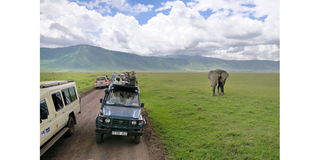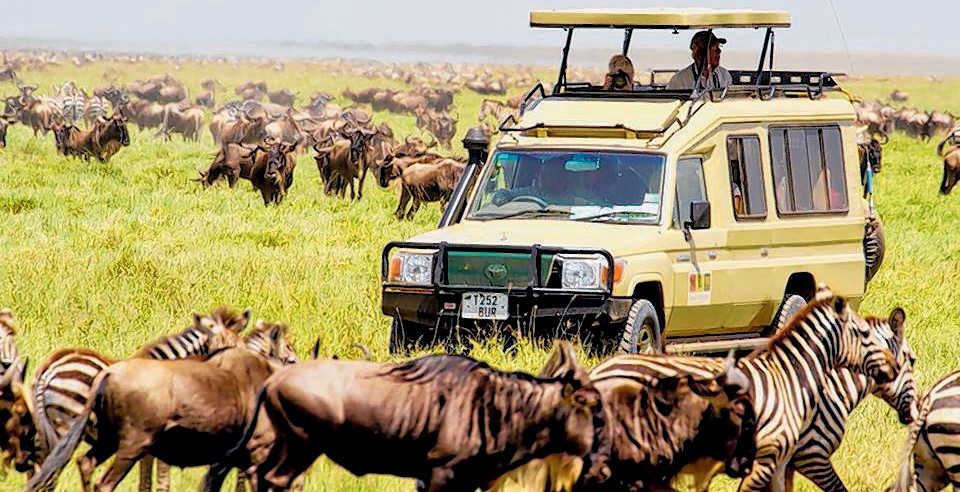Tanzania Association of Tour Operators says Oakland Institute's claims are baseless

What you need to know:
- The California-based Oakland Institute claims that the Tanzania National Parks have forcibly displaced local communities from the Usangu wetland area within Ruaha National Park to pave the way for tourism ventures
Arusha. The Tanzania Association of Tour Operators (Tato) has firmly denounced a series of baseless allegations made by foreign non-state actors regarding supposed human rights abuses in the country.
This statement comes amid growing concerns within the Tanzanian tourism industry over reports that have sought to tarnish the nation’s reputation with unsubstantiated claims.
The charges, which come from the California-based Oakland Institute, claim that the Tanzania National Parks (Tanapa) have forcibly displaced local communities from the Usangu wetland area within Ruaha National Park to pave the way for tourism ventures.
The tourism body, with 300+ professional tour operators, defends the Tanzanian government’s swift move to incorporate key water catchment areas of the Ihefu and Usangu Plains into Ruaha National Park south of the country, saying the 2008’s decision tamed massive unsustainable agricultural and pastoral practices.
The Oakland Institute published a report last year claiming the Tanzanian government was expanding Ruaha National Park to boost tourism receipts at the expense of the interests of the surrounding villagers.
The eviction exercise, coupled with routine patrols of Ruaha National Park, according to the institute, also saw law enforcers confiscating property of the villagers, mostly livestock, fish and other trophies caught in the water catchment areas.
The institute roped in the World Bank in its report, blaming the international financial institution for supporting Tanzania in its bid to promote tourism south of the country.
The WB, as a result, suspended the funds.
Tanzania secured a $150 million loan from the World Bank in 2017 to implement its eight-year Resilient Natural Resource Management for Tourism and Growth (REGROW) project involving Ruaha, Nyerere, Mikumi and Udzungwa national parks, all situated in its virgin southern tourism circuit.
“It is understood that Ruaha National Park receives few visitors and its management is a drain on the resources of the country; that is a fact and contradicts the Oakland Institute’s claims that its expansion was for tourism revenue,” reads the Tato statement in part.
A key Tato member, Mr John Corse, argues that if the Oakland Institute’s intentions were honourable, they would have been talking about strengthening Tanzania’s capacity to manage these delicate land issues rather than pressuring the World Bank to pull the funding.
“Enough is enough; we can’t just sit on the fence while our tourism destination is under attack by these foreign NGOs over unfounded allegations of human rights violations,” reads a powerful statement from Tato.
The Association contends that the NGOs, often in collaboration with local associates, have been leveraging biassed reports to unfairly brand Tanzania as a violator of human rights in its efforts to balance conservation with tourism business.
The tourism industry, a vital pillar of Tanzania’s economy as it earns $3.4 billion annually, relies heavily on the nation’s pristine natural environments and hospitable cultural heritage.
Recognising this, Tato has highlighted the country’s longstanding commitment to conservation and responsible tourism.
“Tanzania deserves world recognition for its dedication to conservation and responsible tourism. The country has sacrificed over 30 percent of its land mass for conservation,” the statement continues.
Tato added: “Even when it becomes necessary to relocate people for conservation reasons, the government’s approach has always been voluntary, humane, and accompanied by numerous incentives.”
Tato’s robust defence centres on the fact that worldwide, human activities that are incompatible with conservation efforts often necessitate the relocation of people to preserve natural heritage for both present and future generations.
“That’s exactly what Tanzania does,” asserts the Tato statement, underscoring that the ethical and voluntary nature of such relocations within the country’s borders deserves global recognition rather than attack.
The association emphasises that Tanzania’s actions are consistent with global practices, wherein conservation priorities sometimes require human settlements to be restructured or relocated to ensure long-term environmental sustainability.
Tato argues that these measures are not only necessary but are also carried out with a human-face approach that seeks to benefit the local communities through incentives and full support.
Tato’s steadfast position serves as a clarion call to both local and international stakeholders to recognise the country’s unwavering efforts to strike a balance between human habitation and conservation imperatives.
As the narrative unfolds, Tanzania’s tourism operators are determined to protect the nation’s image and affirm the country’s rightful place on the world stage as a leader in responsible conservation and tourism.
In an era where misinformation can rapidly influence public perceptions, Tato’s statement reaffirms the importance of relying on factual, balanced reporting and encourages tourists and global observers to witness firsthand the country’s magnificent landscapes and progressive conservation initiatives.
This relentless advocacy by Tanzania’s tour operators underscores their commitment to preserving the country’s tourism allure and its integrity against unwarranted external attacks.
Tato’s message is clear: “Tanzania is dedicated to maintaining its natural heritage and will continue to do so with a responsible, humane approach that can serve as a model for the world.”
The regionally seasoned tourism expert, Mr Sirili Akko, says that the Oakland Institute should leverage its invaluable resources and expertise to collaborate effectively with the Tanzanian government on sustainable conservation initiatives.
“By joining forces, both entities can amplify their impact, ensuring environmental preservation while fostering socio-economic growth for local communities, rather than focusing solely on critiquing the Tanzanian government’s efforts,” Mr Akko explained.





